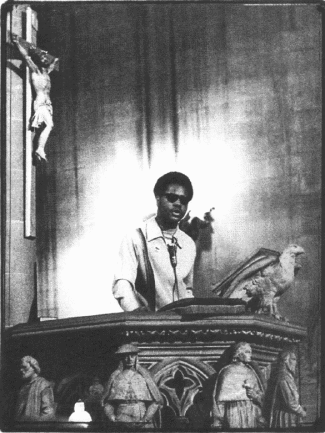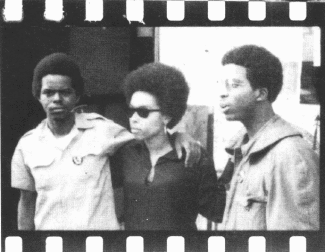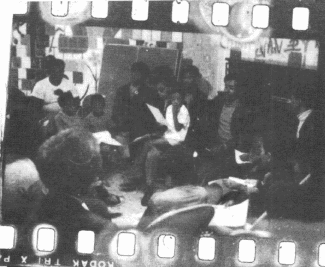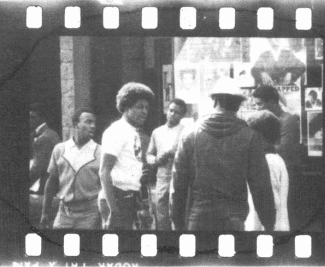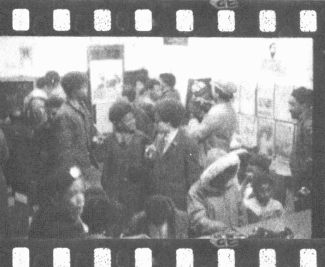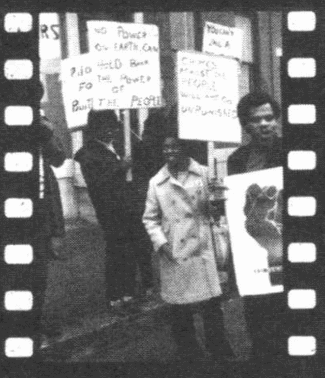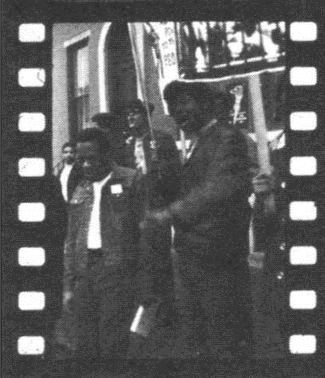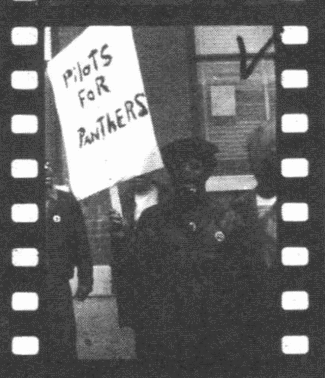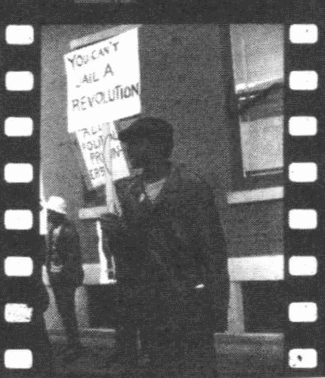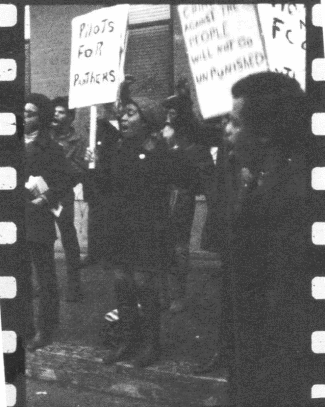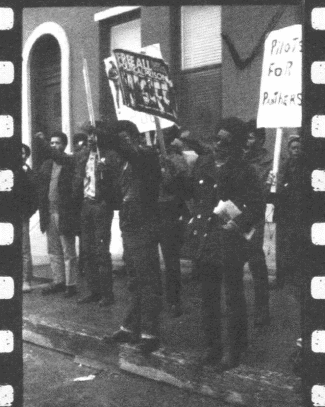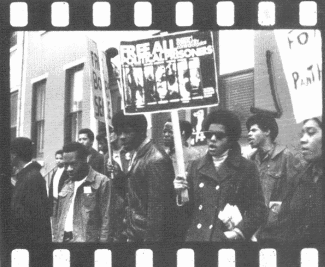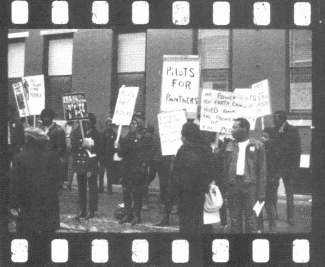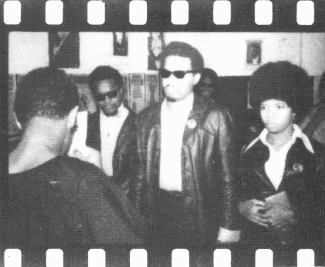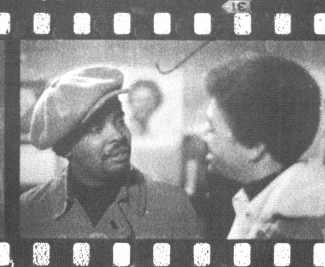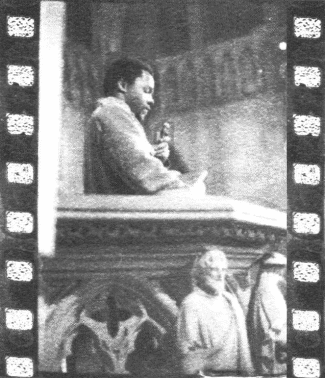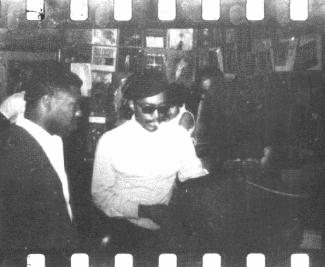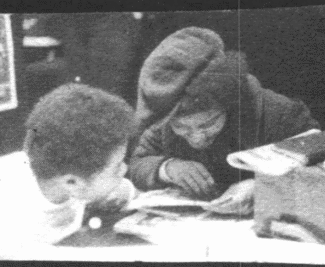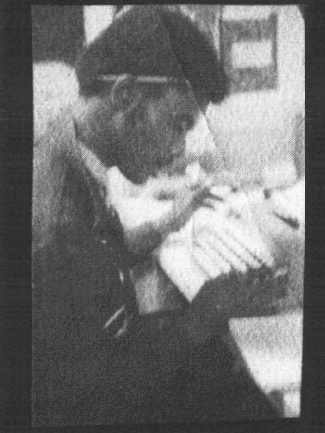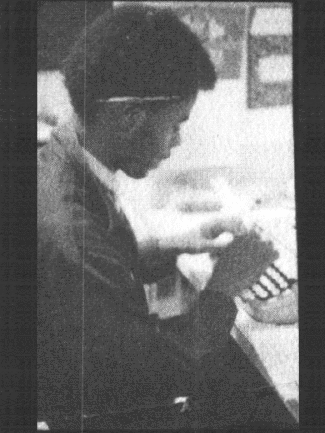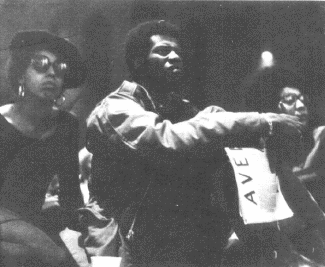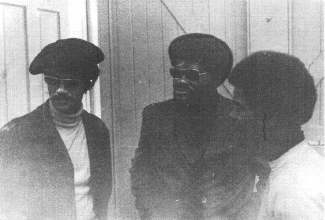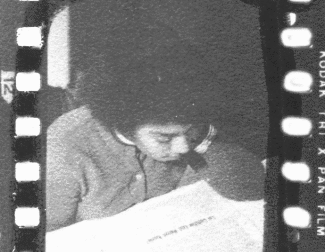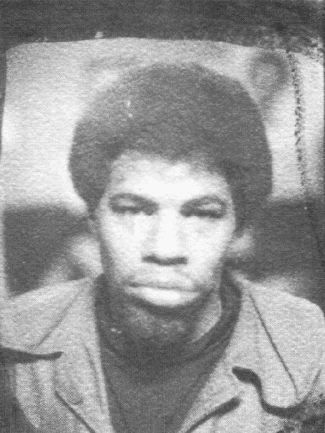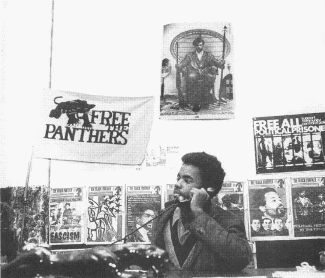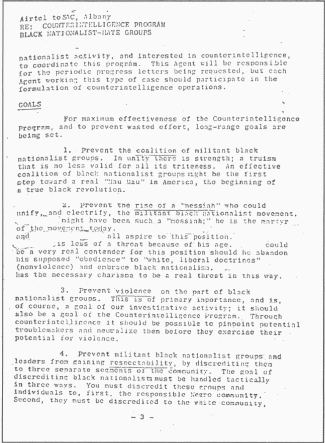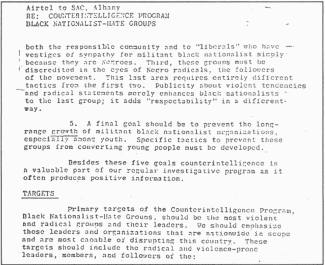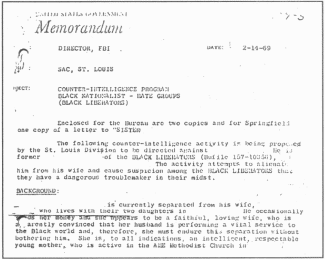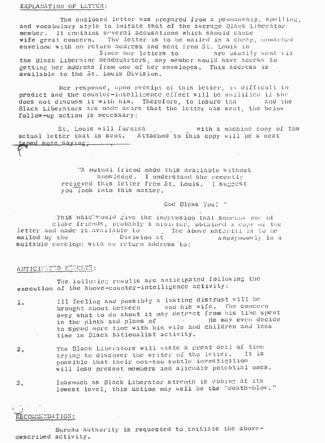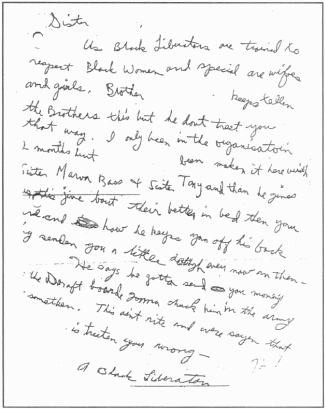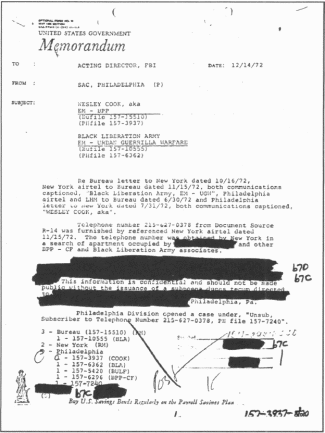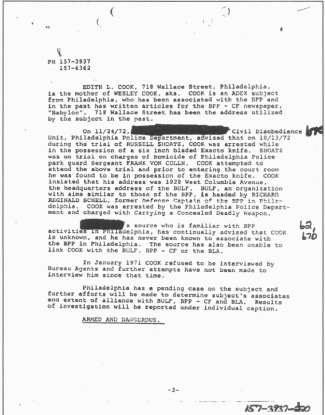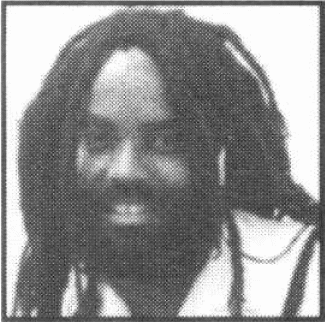Society in every state is a blessing, but government even in its best state is but a necessary evil; in its worst state an intolerable one; for when we suffer, or are exposed to the same miseries by a government, which we might expect in a country without government, our calamity is heightened by reflecting that we furnish the means by which we suffer.
-- Thomas Paine, American Revolutionary, Common Sense [1]
THE HIDDEN HAND of COINTELPRO is often felt in the loss of life, of liberty, and the like. These are indeed dire measurements of the project, but there are other measures, infinitely more difficult to gauge, of its woefully widespread and deleterious effects.
These secondary and tertiary effects of the government's illegal campaign against Black political opponents split asunder one of the nation's most vigorous and ambitious revolutionary organizations -- the Black Panther Party -- a shattering that disproved the mathematical axiom that the whole is equal to the sum of its parts.
For, in severing the Party and dismembering its remnants, it forced the very notion, not to mention the expression, of revolutionary internationalism underground, denying an oppressed people their inherent right of self-determination, and derailing their struggle for true, independent self-expression, and yes, sovereignty, free from the constraints of the oppressor nation.
Using brutal police repression on the one hand, and false, deceptive brownmail on the other, the State utilized a divide-and-conquer tactic that worked surprisingly well.
Here are the basic five techniques employed in domestic espionage.
Surveillance: Direct visual spying on people; mail-snooping and monitoring of conversations, either by phone taps or the planting of mics inserted in adjacent rooms or buildings.
Infiltration: Seeding groups with police agents or using members for purposes of internal surveillance or as agents provocateurs to entrap others in illegal acts.
Intelligence-gathering: The gathering and compiling of data to use in destabilization efforts.
Destabilization: Any effort that derails, disrupts, frustrates, or weakens the organization's ability to function or fulfill collective objectives.
Neutralization: A bureaucratic euphemism for the murder, elimination, or removal of political opponents; the forcing of an organization to cease its operations or to disband.
The FBI, through its infamous COINTELPRO operations, did all that it could to disrupt the Black Panther Party. An FBI memo from 1970 reports:
A wide variety of alleged authentic police or FBI material could be carefully selected or prepared for furnishing to the Panthers. Reports, blind memoranda, LHMs [letterhead memoranda] and other alleged police or FBI documents could be prepared pinpointing Panthers as police or FBI informants; ridiculing or discrediting Panther leaders through their ineptness or personal escapades; espousing personal philosophies and promoting factionalism among BPP members; indicating electronic coverage where none exists; outlining fictitious plans for police raids or other counteractions; revealing misuse or misappropriation of Panther funds; pointing out instances of political disruptive material and disinformation; etc. The nature of the disruptive material and disinformation "leaked" would only be limited by the collection ability of your sources and the need to insure the protection of their security. [2]
This memo delineates the FBI's intent to snitch-jacket Panthers, that is, to falsely portray Panthers as snitches, and, by so doing, to threaten their continued performance in the Party by exposing them to improper expulsion, heated conflicts with other Party members, and perhaps worse. No one, outside of the FBI, that is, really knows how many Panthers unjustly suffered from such submissions.
The other serious, and certainly anticipated, effect of such insidious operations as FBI snitch-jacketing was that it frayed and eroded trust between comrades. This aura of distrust was one of Hoover's prime objectives, for amidst such widespread distrust and incipient paranoia, no organization could meaningfully function.
It is necessary here to state the obvious: the FBI's objective was not to disrupt the breakfast program, to interrupt membership drives, to cripple Black Panther newspaper sales, or even to kill or imprison Party operatives. These were mere incidentals. The primary objective was the destruction of the Black Panther Party as an independent Black radical presence in the American body politic.
Former New York Panther leader and long-time political prisoner Dhoruba bin Wahad has described the State's counterintelligence program as "a domestic war program, a program aimed at countering the rise of black militancy, black independent political thought." [3] As usual, the outspoken bin Wahad got it exactly right.
The East-West split had many beginnings, some known, some unknown, with the State skillfully manipulating the noxious toxins of ego, pride, and envy among key Party officials. Hoover authorized false letters to all of these leaders, ostensibly from the others. Each letter was critical of another Party leader for some perceived fault or flaw.
Such letters, because of the hierarchical nature of the Party and the aura of paranoia that permeated the time -- fueled by the incessant military attacks on Party offices and homes -- seemed like another form of attack and, to some, treason.
Despite the ideological claim that the Party functioned under the principle of criticism and self-criticism, the Party hierarchy in fact functioned much like any other group in bourgeois society, that is, according to the principle of power dynamics: those who have power strive mightily to keep it -- period.
So when Huey received letters full of criticism of his leadership, he struck out at those he thought were angling to undermine his rule of the organization. When Eldridge received letters critical of Huey's leadership, he felt a sense of affirmation. Neither apparently questioned the authorship of this critical correspondence.
Why would they? Why should they?
Neither they nor their subordinates had any real idea of the existence, and definitely not the extent, of government brownmail and other assorted dirty tricks. If someone had suggested that the government, the American government, was involved in writing poison pen letters pretending to be who they were not, most would have laughed, ridiculing the person as a fan of James Bond films or as paranoid.
It is ironic that revolutionaries, who swore an oath to replace the incumbent government, would yet still believe, essentially, that there were limits to what that government would do to preserve its hold on power.
This begins to make sense when one considers the deepest philosophical roots of the Party. While some might identify the philosophical basis as Marxism, or its later variation, Maoism, others would prefer Black nationalism, Black revolutionary internationalism, or, as we have suggested, Malcolmism.
None of these truly answer the question, for while they identify a stage of the Party's ideological development, the underlying philosophical approach, as based in Huey as the heart of the Party, was essentially a legalist one.
An examination of the early history of the Party, reveals, even in the events that evoked the most coverage in the corporate press, an intensely legalistic perspective. Huey was deeply influenced by the letter of the law.
Few researchers, scholars, or historians have fully analyzed this facet of Huey's worldview, preferring instead to project him as the outlaw.
This may be seen in the way that two seminal events, the BPP's armed monitoring of the Oakland police and the BPP armed demonstration in Sacramento on May 2, 1967, were told by the government and by the press.
The tone set by the State, and subsequently carried by much of the white press, may be seen in the following quote from the US House Subcommittee on Internal Security Report on the Black Panther Party:
On May 2, 1967, twenty-four members of the Black Panther Party invaded the California State Assembly at Sacramento while it was in session. The invaders were armed with rifles, shotguns, and pistols, and claimed they were there to protest a gun registration law. Security guards seized the weapons, unloaded them, and returned them to the panthers, who then walked out of the building. [4]
This account, based on the congressional testimony of Director J. Edgar Hoover, aside from its factual inaccuracy, reflects the slant adopted by much of the corporate media, which places the Panthers in the role of invaders or, by implication, outsiders. One would suppose they were aliens, not citizens who were entitled to exercise their constitutional and statutory rights as such. The account also doesn't give the slightest hint that these men were behaving in ways that were legal in California, in regard to both arms possession and their open display. In fact, had their actions not been legal they would not have been at the state house protesting, for the purpose of the new law they were opposing was to outlaw) such behavior.
Huey, who constantly studied California law books, turned to the myths and language of the law constantly, and these ideas in turn influenced his outlook long before his introduction to Fanon. We know the value Newton placed on legal concepts because we see it in many of the platforms set out in the Black Panther Party's 10-Point Platform and Program. The US Constitution is specifically cited three times, its language, "fair and impartial," is borrowed directly, and the Declaration of Independence is partially excerpted verbatim in the "What We Believe" section of the tenth point.
This legalistic bent was not only in the mind of the founder of the Black Panther Party, but shared by many Panthers who emulated and admired Huey. Not surprisingly, David R. Papke, a law professor who has studied Newton's writings and his early courtroom adventures, found him to have the mental makings of a potentially "fine lawyer." [5] While Papke doubtless meant it as a compliment, it also had a negative connotation: legalists believe that there are legal limits beyond which the State may not go.
To the average Panther, a young man or woman of seventeen to twenty years of age, there really was no frame of reference that would alert them to the level of "dirty tricks" that the State was capable.
Former Panther and former political prisoner Assata Shakur, perhaps spoke for many when she mused:
No one could have known that the FBI's COINTELPRO was attempting to destroy the Black Panther Party in particular and the Black Liberation Movement in general, using divide-and- conquer tactics. The FBI's program consisted of turning members of organizations against each other, pitting one Black organization against another. [6]
Why could no one have known?
There may be several reasons: youthful naivete, a strong sense of legalism, or perhaps, as the former political prisoner Geronimo ji-Jaga would tell a German journalist, Panthers didn't really think that what they were doing could be seen as wrong and, further, they didn't think they were important enough to warrant that kind of intense government scrutiny or that level of government repression. [7]
What was quite unknown at the time was that the FBI held secret files on some two million Americans, from the paranoid, drug-addicted Elvis Presley to the absent-minded Albert Einstein. [8] Few Americans, Black or white, had any idea of the scope of FBI and other governmental spying, infiltration, and destabilization of organizations engaged in (allegedly) constitutionally protected activities and organizing efforts, such as the anti-Vietnam War, woman's liberation, and Civil Rights movements. If one wrote a letter to the editor of a newspaper or made a phone call to a "target," a file was opened and one's life could be irreparably and surreptitiously damaged.
Letters from the Feds
Party leaders regularly received mail from various Party offices and the community. It is a telling reflection of the times that a leader really would have no immediate way of knowing whether the writer of the letter was a cherished comrade, or an agent of the FBI. The following is the full text of a letter mailed to the Minister of Information, Eldridge Cleaver, at his Algerian offices in early 1971:
Eldridge,
John Seale told me Huey talked to you Friday and what he had to say. I am disgusted with things here and the fact that you are being ignored. I am loyal to the Party and it makes me mad to learn that Huey now has to lie to you. I am referring to his fancy new apartment which he refers to as the throne. I think you should know that he picked the place out himself, not the Central Committee, and the high rent is from Party funds and not paid by anyone else. Many of the others are upset about this waste of money. It is needed for other Party work here and also in Algeria. It seems the least Huey could do is furnish you the money and live with the rest of us. Since Huey will lie to you about this, you can see how it is with him. You would be amazed at what is actually happening.
I wish there was some way I could get in touch with you but in view of Huey's orders it is not possible, You should really know what's happening and statements about you. I can't risk a call as it would mean certain expulsion. You should think a great deal before sending Kathleen. If I could talk to you I could tell you why I don't think you should.
Big Man [9]
The apparent writer was a "big man" named Elbert Howard, who edited The Black Panther for a time (and was known by the nickname Big Man).
But Big Man Howard, FBI files reveal, never wrote this letter. Its recipient, Eldridge Cleaver, did not know this, and thus the fake letter achieved its desired objectives. It insinuated itself between Cleaver and Newton, and it encouraged Eldridge to discourage his wife, Kathleen, from coming to the US to, among other things, speak at the Washington segment of the Revolutionary People's Constitutional Convention (RPCC).
Newton wanted Kathleen Cleaver to help promote a number of Party projects, including the support of the imprisoned and endangered Bobby Seale and Ericka Huggins, for whom a series of rallies were planned. Newton knew that this attractive, articulate, and knowledgeable Panther leader could move and electrify a crowd, something the introspective Minister of Defense never truly mastered. He realized that he spoke in a "dull fashion," and he perhaps remembered the disquieting events in Philadelphia months before and had no wish to replicate them. [10]
When the RPCC's Washington session began, Newton had no idea why the Party's Communication Secretary hadn't communicated with him and had not appeared, as promised and advertised. Huey felt this was further evidence that the Cleavers were trying to seize control of the Party.
This important Party project, which sought to create a broader, institutionalized revolutionary structure, foundered in its crib, at least in part because Kathleen didn't appear. The Party could not seize the moment to spark the vast throng, who either attended or followed the events of the RPCC, into action.
Kathleen apparently didn't appear because Eldridge didn't want her to appear, and Eldridge didn't want her to appear because he was being flooded with false, COINTEL-initiated correspondence that played on his ego and his fears and, given his extreme degree of isolation in Algiers, he believed to be true.
Indeed, this was the FBI's explicit intent, as seen by a December 1970 memo that instructed its agents to:
[W]rite numerous letters to Cleaver criticizing Newton for his lack of leadership. It is felt that, if Cleaver received a sufficient number of complaints regarding Newton it might ... create dissension that later could be more fully exploited. [11]
Their diabolical plan seemed to be working to perfection.
There was another reason why enmity was building between the Minister of Defense and the Minister of Information. Newton, again apparently believing the plethora of reports corning to him, began to order purges of anyone that he suspected might challenge his authority.
After the LA chapter's defense against the quasi-military forces of the LAPD, Geronimo emerged as a hero among Panthers. He was deeply respected for bringing out his troops alive and giving the State up to six hours of resistance. When the State's undercover efforts were exposed at the subsequent trial of the LA Panthers and the jury tossed their case, they emerged from the joint to a hero's welcome. The Black Panther called Geronimo's actions representative of "the essence of a revolutionary." [12] Geronimo's 1970 release, however, would mark a fateful turning point for him and the Party. Upon his release, he went underground and set up a secret camp in Texas where he used his Vietnam-acquired skills to train an underground military force for the Black Panther Party. However, shortly after an emissary from Hilliard arrived at their location, the place was swarmed by CSS agents, the Panthers were busted, and Geronimo was immediately returned to Los Angeles.
While Geronimo was awaiting trial in December, he came across an article in The Black Panther denouncing him and claiming he was working for the CIA. [13] Geronimo ji-Jaga, once a hero called "the essence of a revolutionary," had been labeled an "enemy of the people" and purged from the Black Panther Party.
The report that Geronimo was now considered an enemy rocked the organization. Within weeks of the Geronimo purge, members of the New York-based Panther 21 also found themselves labeled enemies. Some of these "enemies" were facing serious charges at the hands of the State. The timing was ugly. By February 1971, it was clear that a split was weaving its way through the Party, as respected comrades were praised one week, only to be condemned the next.
It was maddening.
Letters from the FBI to leading Party members sparked increased paranoia and higher spirals of instability and danger. Who knew who was writing to whom?
Letters signed by prominent Party members flowed to the exiled, isolated Minister of Information, who badly wanted to get back into the swing of things in the States. The letters virtually dripped with vitriol for the equally isolated (in his penthouse apartment) Minister of Defense. What is lamentable is that there is every indication that Cleaver and Newton believed the accounts coming to them, never questioning their authenticity.
Consider the following examples, the first allegedly from an influential Party member, Connie Matthews -- a brilliant, able activist who served as Newton's personal secretary:
I know you have not been told what has been happening lately.... Things around headquarters are dreadfully disorganized with the comrade commander not making proper decisions. The newspaper is in a shambles. No one knows who is in charge. The foreign department gets no support. Brothers and sisters are accused of all sorts of things.
I am disturbed because I, myself, do not know which way to turn .... If only you were here to inject some strength into the movement, or to give some advice. One of two steps must be taken soon and both are drastic. We must either get rid of the supreme commander [a BPP reference to Huey Newton], or get rid of the disloyal members.... Huey is really all we have right now and we can't let him down, regardless of how poorly he is acting, unless you feel otherwise. [14]
One of Cleaver's white supporters, "Algonquin J. Fuller" who claimed to be a member of Youth Against War and Fascism in New York, sent the following letter to Algiers:
Let me tell you what has happened to our brothers in the Party since you have left and that "Pretty Nigger Newton" in his funky clothes has been running things....
Brother Eldridge, to me as an outsider but one who believes in the revolution, it seems that the Panthers need a leader in America who will bring the Party back to the People.
Brother Newton has failed you and the Party. The Panthers do not need a "day time revolutionary, a night time party goer and African fashion model as a leader."
They need the leadership which only you can provide. [15]
Through their contacts within and without, the FBI learned that letters such as these were getting to Cleaver and that he thought they were genuine.
Their files reveal a Bureau that was almost giddy with glee at their apparent success, with one file noting "Cleaver has never previously disclosed to BPP officials the receipt of prior COINTELPRO letters." [16]
Shortly after the February 1971 so-called "Big Man" letter, what was originally the private province of correspondence soon became public proof of a conflict between the two most influential members of the Party.
Newton phoned Algiers to invite Cleaver to join him in a television call-in show later in the day. Cleaver readily agreed. When the station's call got through, Cleaver's voice was angry and tight, and he launched into a furious, on-air verbal attack on the Party's Central Committee. He demanded that Newton dismiss the Chief-of- Staff, David Hilliard. Newton responded in kind by attacking Cleaver personally, calling him a "punk" and a "coward."
The breach was complete.
This was far more than a falling-out between two hard-headed men. It signified the rending of the organization itself, a split that would tear east from west.
As Cleaver fell under the spell of COINTEL-produced correspondence, so too did Newton succumb to the lure of letters surreptitiously scripted by the invisible agents of the State. As the founder and the head of the Party, Newton undoubtedly received the lion's share of brownmail. In his 1980 doctoral thesis (in which he referred to himself in the third person), Newton recounts the time he received a sheaf of documents from Philadelphia:
The Philadelphia FBI field office prepared and sent to Newton a fictitious Black Panther Party directive, supposedly prepared by the Philadelphia Black Panther Office, which questioned Newton's leadership abilities; accompanying it was a cover letter purportedly from an anonymous Party supporter accusing the Philadelphia chapter of "slandering its leaders in private." FBI headquarters, in approving this operation, noted that prior COINTELPRO action which "anonymously advised the national headquarters that food, clothing, and drugs collected for BPP community programs were being stolen by BPP members" had resulted in criticism of the Philadelphia chapter by the national office, transfer of members, "and the national office has even considered closing the Philadelphia chapter." The memorandum concluded, "we want to keep this dissension going." [17]
If the Philadelphia chapter had it rough, what of the members of the biggest chapter in the nation -- New York?
New York arguably boasted the most influential and certainly best-known Panthers outside of the California chapters. They were an astute bunch who published a remarkable collective autobiography from prison, a kind of political memoir that sold briskly in the nation's mass media hub. The New York Panthers were immensely popular, not just in the ghettos and barrios of New York, but throughout the country.
Leading New York Panthers like Dhoruba bin Wahad, Afeni Shakur, Michael "Cetawayo" Tabor, Lumumba Shakur, Zayd Malik Shakur, and Beth Mitchell had the good looks, oratorical skills, and charismatic presence that the media seemed to love. It was precisely these qualities that made some of the New York Panthers prime targets for FBI and government neutralization. The somewhat California-centric Party could not help being challenged by the growing prominence of its eastern half, and the agents of COINTELPRO were there to exploit this incipient envy.
Not content with their neutralization of the Panther 21 by unjust incarceration, the FBI, learning that the group made public a letter critical of Newton's increasingly autocratic rule, proceeded to produce and send other letters, in the name of the 21, to Eldridge and Huey, each critical of the other. Huey expelled the authors (all but Dhoruba and Cetawayo, who were out on bail, and thus hadn't signed the letters), sending ew York to the brink of revolt. Meanwhile, the FBI wrote this letter to the international office in Algiers:
As you are aware, we of the Panther 21 have always been loyal to the Party and continue to feel a close allegiance to you and the ideology of the Party which has always developed mainly through your efforts.
We know that you have never let us down and have always inspired us through your participation in the vanguard party. As the leading theoretician of the party's philosophy and as a brother among brother [sic], we urge you to make your influence felt. We think that The Rage [that is, Eldridge Cleaver] is the only person strong enough to pull this factionalized party back together ....
You are our remaining hope in our struggle to fight oppression within and without the Party. [18]
One Harlem Panther, Assata Shakur, would still simmer at the mass expulsion of the 21 many years later and expressed wonder at the efforts of the government to destroy the Black Panther Party:
Zayd [Malik Shakur, New York's Deputy Minister of Information] was acting as peacemaker between Huey and the Panther 21, furiously trying to get Huey to rescind his expulsion order. Zayd felt that to take any position in reference to the problems might jeopardize his role and result in dire consequences for the Panther 21. Cetawayo and Doruba, who had not been expelled because they were out on bail and had not signed the letter, were also attempting to get the Panther 21 reinstated. Huey wanted them to support the expulsion and the expelled Panthers wanted them to criticize Huey's actions. [19]
Their efforts, while undoubtedly noble, did not fit the frenetic temper of the times. Theirs was a call to reason and restraint, in an era of paranoia and widespread distrust:
Like Zayd, Cet and Dhoruba honestly believed they could straighten out the madness. And were it not for the FBI, they probably would have. Nobody could possibly have known that the FBI had sent a phony letter to Eldridge Cleaver in Algiers, "signed" by the Panther 21, criticizing Huey Newton's leadership. No one could have known that the FBI had sent a letter to Huey's brother saying the New York Panthers were plotting to kill him .... Huey ended up suspending Cet and Dhoruba from the Party, branded them as "enemies of the people," and caused them to go into hiding, in fear of their very lives. No one had the slightest idea that this whole scenario was carefully manipulated and orchestrated by the FBI. [20]
The FBI, having achieved their objectives of splitting apart the two most influential Panther chapters in the nation, was thrilled at the level of their success. By March 1971, a new range of orders went into the field, based upon the same tactics that were used previously:
Since the differences between Newton and Cleaver now appear to be irreconcilable, no further counter-intelligence activity in this regard will be undertaken at this time and now new targets must be established. David Hilliard and Egbert [sic] "Big Man" Howard of national headquarters and Bob Rush of the Chicago B.P. Chapter are likely future targets ....
Hilliard's key position at the National Headquarters makes him an outstanding target. Howard and Rush are also key Panther functionaries ... making them prime targets. [21]
That the FBI began to target other, second-tier Panthers suggests that the emphasis on Newton and Cleaver was based upon the leaders' Party-wide and national influence, rather than their discrete personalities. Yet both men were fashioned in ways that made them particularly vulnerable to the FBI shenanigans. Both were remarkable men, with abilities and strengths that made them indispensable for the tasks thrust upon them by history. Yet, like all other mortals, they had vulnerabilities, weaknesses, and tendencies that, when exploited, could open the door to disaster. Some of these traits are revealed by how the two men fell into the traps prepared for them by the class enemy -- the State.
The Power of Personality
It is beyond dispute that Huey P. Newton was a man of signal brilliance and truly remarkable courage. In many ways, the Black Panther Party came into being because of his will, and his strength. While those are positive attributes, they also had negative aspects. Huey, while nominally ranked below the Chairman, was, in fact and in our consciousness, the first Panther, the de facto Leader. Thus he was the first among unequals. He was a model that all Panthers aspired to.
Eldridge Cleaver, as an ex-convict and author, brought to the Party more than his writing skills and his notoriety. An adept and exciting speaker, Eldridge brought a public strength to the Party that it lacked, given Huey's real aversion to public speaking. His criminal background, indeed, gave the Party a kind of street credibility to its claimed lumpen origins.
Eldridge also brought to the Party his contacts in the white radical fringe that did not really warm to Huey.
Yet the Cleaver-Newton alliance had its fault lines, and ego was one of them. It is apparent when one reads the letters from the FBI to Eldridge that each of them appeals to his ego, with almost saccharin pleas like "only you can provide the leadership" that the Party needs and suggestions to get rid of Huey and the like.
For someone who was some 7,000 miles away from home, in exile, who dearly wanted to come home to the States, the letters to Cleaver must have been heady stuff.
As for Huey, it appears the Minister of Defense had several traits that first exploded in his conflict with Eldridge and later with other, mostly ea6tern, Panthers.
In his earliest years of adolescence, Huey fought hard, mostly against his fellows in the neighborhood, and suspected anyone who he didn't know was friend to be his enemy. [22] Can we say that this formative experience and youthful inclination simply disappeared when he created the Party as a young, angry man?
It appears that this deep, instinctual way of knowing, or of fearing the unknown, may have been a powerful factor in Huey's relationships with other Panthers. Consider this: when Huey went to prison in 1967, he had a personal connection with every man or woman who was a member of the Black Panther Party. Usually he or Bobby knew them from the neighborhood and had recruited them. If they didn't know them, then they certainly knew of them or knew the people who recruited them. Three years later, free on appeal in 1970, the Party he knew was tremendously transformed. There were now branches and chapters not in three geographically close cities (Oakland, San Francisco, and Richmond), but in over forty-three. The largest chapters were in Los Angeles, Chicago, and New York. Huey didn't know any of these people. He never rapped with them. He knew of them, certainly, but he must have wondered where they stood, or where they would stand, in times of strife and battle.
Could he trust them?
Conversely, to many of the young men and women who joined the Party in other parts of the nation, Huey was the brother on the posters on our office walls. He stood, steely-eyed, beside a flint-jawed Bobby Seale, a shotgun in his grasp. Or he sat, like an African warlord, in a wispy wicker chair, a shotgun in one hand and a spear in the other. They did not know him. They only knew his image.
There were few of the real human ties of sympathy and concern that grew from shared struggles on the ground.
Huey tended to make leaders of those people that he knew from his pre-Party street life, his homies and friends. While these were undoubtedly people that he trusted, they often were people who were, quite frankly, ill equipped to handle the pressures and stresses of directing and managing an international organization.
What appears to have happened is that guys whom Huey trusted tended to carry Huey's water, rather than question his decisions on matters involving Party discipline. They became, not his comrades, but his emissaries, instruments of his will. It was to men such as these that the term Huey's Party had meaning and verity.
David Hilliard's autobiography is instructive in this regard in at least two respects. He writes that he was stumped by the central work of Fanon, The Wretched of the Earth, which was so important to the founders of the Party. He also describes an event in which he, drunken and frustrated, walks out of his home and takes a potshot at a passing cop car, an expression of his giving vent to "the madness." [23]
While this behavior perhaps reflects the actions of a drunkard, therefore somewhat mitigating the charge, it raises justifiable questions about his ability to effectively manage the affairs of the nation's largest Black revolutionary organization. It suggests that Hilliard was in over his head. Shortly thereafter, Hilliard is counseled by Seale, who explains to him the rudimentary notion of the revolutionary process as an extended one, and not an emotional or instantaneous response to external stimuli. David listens as if it's the first time he has heard such ideas. [24] Clearly, then, while Hilliard may have held Huey's trust and his affection, it is doubtful that he possessed the managerial or interpersonal skills necessary for a group composed of young, angry Black people who wanted to fight to bring freedom to their people. That didn't mean, of course, that David was somehow stupid or didn't learn the lessons needed to do the task. It means only that Hilliard's prerequisite for the job was his deep, personal loyalty to Huey, and while that served Huey's interests, it did not necessarily serve the interests of a growing, changing Black revolutionary political party.
It seems easy, in time's hindsight, to be critical of Huey for appointing people who seemed ill equipped for the job. It is also somewhat unfair for us to do this, especially given the ungodly levels of repression visited upon the Party at the time. There were raids all across the nation, some fatal. The Party was under direct and sustained military and political attacks. That is to say, it was not an easy task. Further, where was Huey to find the people more prepared for the job? Put an ad in the campus newspaper at Howard University? Put an ad in The Black Panther?
At tl1e time, perhaps the best-educated Panther may also have been its most treacherous -- Earl Anthony. Anthony, who was several credits short of his law degree when he joined the Party, would go down in history as the Party's first snitch. It is bad enough that he was given the rank of Captain and was sent to help organize the LA chapter. Even though he was intelligent enough to take on the task of Chief-of-Staff, there was also the growing suspicion that he was not cool -- they didn't think he was a snitch exactly, but fishy in some way. If he had been given the rank of Chief-of-Staff, the disaster that befell the Party might have been even more tragic.
As a rule, given the Party's rhetoric about being a lumpen group, credentials didn't really matter. What mattered was your heart. What mattered was your will.
Yet Huey's parochial instincts; his dis-ease with the new, the unknown, also fed into his behavior toward the end of 1970 and 1971. He essentially distrusted those folks whom he didn't know. Thus, he looked at Panthers in New York and Philadelphia with a jaundiced eye. When he felt he received less than total obedience, he expelled. Period.
While it is undoubtedly true that between Cleaver and Newton there was considerable ideological dissonance, it is also true that one's ideology arose from one's ideation, that is, one's world view, and one's perspective on the world. To suppose that all political ideas arise from the calm, untroubled realm of logic without the influence of one's inner life is to suppose that all that men do in the realm of politics is logical. History, with all of its inexactitudes, gives us sufficient evidence to the contrary. Can anyone claim that the mania of the Nazis regarding Jews during the Reich was logical? With the exception of the value of defining an "other" for the Nazis to focus on, there is little real doubt that the enmity visited upon the Jews came from a psychosocial place where logic doesn't dwell.
Ideologically, Cleaver was a devotee of the paramilitary foco, a form of organization typified by the urban guerrilla campaigns waged throughout much of Latin America. He wanted the BPP to form the nucleus of such groups as a ew World Liberation Front in the US. While this certainly was a direction that was approached by the Party in the late 1960s, and perhaps early 1970s, by 1971, it was not the direction I ewton would advocate. Indeed, by 1972 the BPP, which remained under his control, would opt for an electoral strategy, as Bobby Seale and other leading members ran for local and regional offices in Oakland and its environs.
A 1972 order of the Central Committee commanded all Panthers to centralize in Oakland to support the campaign of Bobby Seale for Mayor of Oakland (and related campaigns for various offices on his slate). The order meant that Panthers from across the country had to close their local offices, close their local community survival programs, and, essentially, leave for Oakland. For some Panthers, this was simply unacceptable. Many people left the Party.
Audrea Jones from Massachusetts was not one of them. She followed the directive of the Central Committee but not without misgivings. She was one of the few women who captained a chapter and was thus deeply involved in the Party's community operations.
She submitted to the will of the Central Committee and joined the Party's efforts in the Bay Area to consolidate power in the birthplace of the organization. Years later, she would state that the decision by the Party was a serious tactical error:
It [the closing of all chapters outside California] was a major mistake. I think that it was a major mistake. It was a national organization with viable structures in communities. I think people felt abandoned by that. There was great support for the Party in local chapters and branches. People had ... put themselves out to be part of that. To just close down clinics and close down breakfast programs. I mean the whole idea was to organize these things to the extent that things could be taken over. But there was a hole left. [25]
The 1972-73 centralization of the Party in Oakland had another impact that was perhaps unforeseen by the Central Committee: it communicated to many common people that the Party was in decline. Why else, people wondered, would the Panthers close down their community programs? Therefore the centralization contributed to the Party's own demise.
It was a continuing diminution, a devolving of sorts, that seemed to suggest that the much-reported split was a reality. Perception became reality. That perception was, if anything, strengthened when Seale lost the mayor's race, albeit after a surprisingly strong showing.
Huey's Return to "The Good Old Days"
According to several published accounts, it was Huey's insistence on the centralization of the Party in Oakland, over the objections of Chairman Bobby, that swung the Central Committee on the question. [26]
While there were arguments for the centralization, it would appear that the main reason was Newton's determination to recreate the Party of his pre-prison memory: to bring all Panthers to Oakland; to close down all other offices; to re-create a smaller, more manageable Party.
To know them.
To test them.
To determine, once and for all, were they friend or foe?
What Huey had demonstrated in his life experience was an extraordinary will. It took will to found the Party. It took will to build the Party. Perhaps his will would allow him to rebuild the Party.
This was not to be.
The split left several groups vying for the legitimacy of the original Black Panther Party -- a western branch centralized in the port city of Oakland; an eastern branch headquartered in the Bronx, New York; and the Black Liberation Army, which drew from the remnants of both.
Within weeks of the Newton/Cleaver breach, Panthers began to die, this time not from the fire of the class enemy, the State, but by the hands of their erstwhile brothers.
Robert Webb, an ex-GI who returned from war for the Empire determined to battle for the liberation of Black people in the US through the Black Panther Party, was shot to death while standing on the corner of 125th Street and Seventh Avenue in Harlem on March 6, 1971, perhaps because, as a western Panther, he dared to ally himself with members from the East.
Six weeks later, Sam Napier, a gentle man who was Distribution Manager for The Black Panther newspaper, was tortured to death in a grimy apartment in New York in retaliation for Webb's slaying. Both Webb and Napier were much-loved and well-respected members of the Party, and their loss precipitated an exodus from the Party of members who felt disgusted at the in-fighting.
The losses of Webb and Napier marked the depths to which interparty rivalry had fallen. Their deaths marked far more than the passing of two dedicated revolutionaries.
It marked the shattered dreams of hundreds of Panthers, who watched as the Party of their dreams become the abode of their darkest nightmares.
Men like Webb, Napier, Fred Bennett, and others known and unknown became unwitting martyrs to madness, while the FBI, and those who sponsored them, cackled with glee.
The split became a divide, which became a rending, which yawned into a canyon.
Like a ruminant, like a wild animal born in the bush with the scent of the predator on the wind, the Black Panther Party sprang into being quickly and rapidly found its footing, running across the vastness of the nation with the swiftness of an African gazelle. It grew quickly and knew its strength in its ability to reproduce itself over forty times in forty different places.
Quietly, under cloak of darkness, the hunter lay, feeding poison into the waters and death into the air.
It awoke one day to find its body severed in twain, pain searing the breach, but miraculously, incredibly, still alive.
Dulled by agony, less than its former self, smaller, less vital, but, for now, alive.

